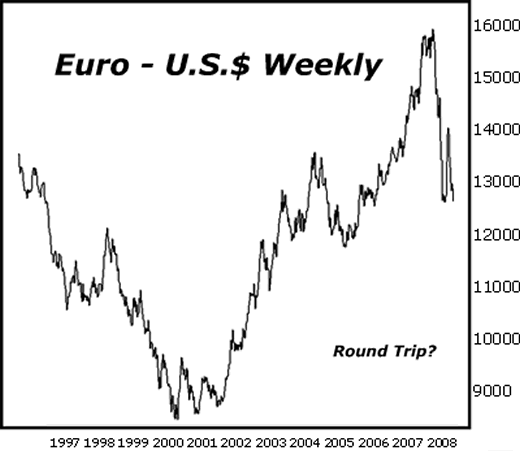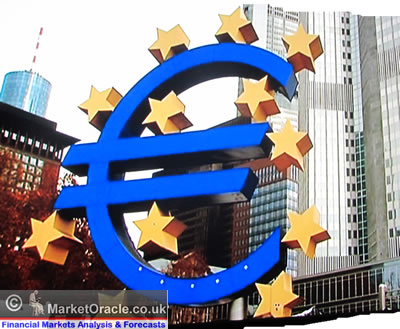European Monetary System at Breaking Point
Currencies / Euro Feb 21, 2009 - 02:38 PM GMT

 When others were fawning over the European Union and its committee creation of the euro, Milton Friedman made this prescient and brilliant comment: “It seems to me that Europe, especially with the addition of more countries, is becoming ever-more susceptible to any asymmetric shock. Sooner or later, when the global economy hits a real bump, Europe's internal contradictions will tear it apart.”
When others were fawning over the European Union and its committee creation of the euro, Milton Friedman made this prescient and brilliant comment: “It seems to me that Europe, especially with the addition of more countries, is becoming ever-more susceptible to any asymmetric shock. Sooner or later, when the global economy hits a real bump, Europe's internal contradictions will tear it apart.”
Bingo!
 |
As you can see from my chart, the euro is plummeting against the dollar, and could possibly come back to its old low of 82 cents …
Now, I don't know which internal contradictions Friedman may have been thinking about when he made that comment. But here are three key ones I see going on today that are causing the euro to tumble:
Internal contraction #1 — Lack of synchronized business cycles …
This has always been a problem because there is only one central bank with one monetary policy to fit all members. The European Central Bank (ECB) generally follows a monetary policy that makes sense for Germany (the largest and most powerful member). That is why the ECB has been very late to the party in lowering rates, which I think has damaged the periphery countries unnecessarily.
Internal contraction #2 — Lack of fiscal discipline among members …
The southern tier members of the union — Portugal, Italy, Greece, and Spain (PIGS) — are fiscal basket cases. On the other hand, Germany and France have maintained the original disciplines. Rising internal political pressures means the fiscal-basket-case countries either have, or will, far exceed the fiscal discipline treaties they signed in order to remain viable members of the monetary union.
This is why risk is now being priced into the monetary system in a big way and can be clearly seen in the widening yield spreads between the weaker countries and Germany.
In fact, not long ago the spreads between the PIGS and Germany were only a few basis points for 10-year bonds. Now they are in the range of several hundred basis points and climbing!
Internal contraction #3 — Lack of political unity …
 |
| Internal fiscal discipline among EU members has been replaced by an “every country for itself” mentality. |
On paper this treaty is called a “union.” But the cultural and political divide among member countries is still palpable; at least when you move outside of Brussels.
So when things get tough, as they are now, it is every country for itself. Nationalist tensions are rising fast. If that genie escapes from the bottle, it's game over, as Mr. Friedman said.
And as if all of this isn't bad enough, the “union” has to deal with huge banking exposure to eastern and central Europe.
If you are a consistent reader of my Money and Markets columns, you know that I have been warning of this looming problem for months. And this week it is finally hitting the headlines of the financial news.
I refer to this as the …
Achilles Heel of the Euro
 |
| With currency investing, it comes down to which economy is in the least bad shape. |
The multi-trillion dollar exposure to defaults in eastern and central Europe — Ukraine, Serbia, Hungary, and Poland — that sits on the balance sheets of banks in Switzerland (non-EU member), Austria, Germany, and Spain will ripple through the union like dominoes. This will surely add even more pressure fiscally and further drain the coffers of treasuries, and possibly cause unbearable damage to the euro monetary system.
Now don't get me wrong, none of this is good news for the U.S. If the euro monetary system comes unglued, it will be yet another drain on global demand and have nasty implications here as well. But it comes back to the old adage of currency investing — it's all relative.
And the U.S. dollar wins by default.
Best wishes,
Jack
P.S. Are you hungry for the latest on what's going on in the currency markets? Then be sure to check out my blog .
This investment news is brought to you by Money and Markets . Money and Markets is a free daily investment newsletter from Martin D. Weiss and Weiss Research analysts offering the latest investing news and financial insights for the stock market, including tips and advice on investing in gold, energy and oil. Dr. Weiss is a leader in the fields of investing, interest rates, financial safety and economic forecasting. To view archives or subscribe, visit http://www.moneyandmarkets.com .
Money and Markets Archive |
© 2005-2022 http://www.MarketOracle.co.uk - The Market Oracle is a FREE Daily Financial Markets Analysis & Forecasting online publication.


